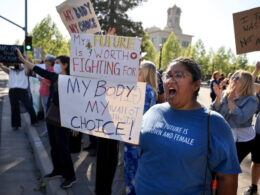Austerity measures have gone so far that they increasingly represent an attack on society itself.
A crucial task facing socialists and activists today is building active solidarity and common action between the struggles of working people across Europe who face an onslaught of austerity. Greece is currently on the frontline of this struggle, where the austerity measures have gone so far that they increasingly represent an attack on society itself – with a massive increase in suicide rates, parents giving up their children because they cannot feed them and a pauperisation of large sections of the population. Therefore, when the suggestion of an emergency delegation to Greece to show solidarity with the Greek workers was raised last week in a meeting of the European United Left (GUE/NGL) group in the European Parliament, I immediately welcomed the suggestion and agreed to participate. I will be writing a daily blog about my experiences there.
The result is that 10 MEPs of the GUE/NGL group arrived in Athens today. Tomorrow, we have a packed official agenda – with meetings with representatives of a struggle against the closure of the social housing section of the Ministry of Labour, of steel workers who have been occupying their factory for over 110 days now as well as with the MPs of both the KKE (Greek Communist Party) and Syriza (a left alliance), who are now the only real opposition in the Greek Parliament.
It does not take long upon arrival for the sense of a social crisis to become evident. As I arrived at Syntagma Square in central Athens, a PAME (the trade union alliance led by the KKE) demonstration against the austerity was just finished. Hundreds of policemen were still there, with a meanicing demeanour and the street in front of the Parliament was effectively blocked. The other sign of the deep crisis that engulfs Greek capitalism is the large numbers of people begging on the streets that are testament to the massive increase of homelessness.
Tonight, I met with members of the Socialist Party’s (CWI in Ireland) sister organisation in Greece, Xekinima, and we visited the Minstry of Health, which has been occupied by workers in psychiatric hospitals and institutions and those working with children with special needs. There, we had a long meeting and discussion about the conditions that face them.
This is a case, as has happened in Ireland, of the most vulnerable in society being targeted for savage attacks by the Troika and the government. Previously, there were three or four major asylums where most of the people with psychiatric problems were kept in very difficult conditions. Then there was an influx of European funds to change the system with a transfer of patients to smaller, much improved institutions. However, the workers argue that the government made no plans for when the European funds dried up in 2005 and 2006 as to how to fund this vital service.
Since then, there has been major problems in the funding of these services. These have then dramatically worsened with the crisis and are now faced with the prospect of essentially closing down. These institutions are run by non profit organisations that are subsidised by the state. In the latest round of austerity, the funding is cut by an incredible 55%. Of course, that means that it is simply not possible to run these services. There is no money to pay the workers or even to buy sufficient food for the patients. The result will be a return to the dark days of institutionalisation in major asylums.
For children with special needs, the situation is also very bleak. Funding for schools for those with special needs has been cut from €25m in 2009 to €11m in 2012, which again means it is basically not possible to keep these schools open. The workers argue that this will mean a return to the dark days which are not so long ago, when children with special needs were kept at home isolated.
A regular feature of life for these workers, as seems to be the case for lots of workers connected to the public sector, is not getting their wages for months on end. Everyone I spoke to had at least experienced many months of no pay, some up to six months and they reported other workers not receiving wages for up to a year. Their wages were also low, at around €1000 per month. So much for the well-paid Greek public sector workers!
These workers have been occupying the Ministry for over two weeks now and it has become a focal point for struggles of workers in the health sector with a 48 hour general strike of doctors starting tomorrow with a protest in front of the Ministry and a major assembly tomorrow in the Ministry to decide on the future of the struggle. It is also clear that this struggle, together with the years of austerity now experienced and the movements against it, has had a profound impact on their political consciousness. Nobody discussed with thought their struggle was an isolated issue to protect simply their own interests, they all connected it to the need to struggle against the Troika and austerity generally. The question of an alternative political and economic system was an integral part of the discussion.
There is an attitude of disgust about the trade union leadership who have provided no real leadership to the mood of opposition and willingness to fight that exists amongst the Greek people. There is also a frustration with the major left parties and a sense that they are not posing a real alternative to the policies of the Troika.. One of the workers made the point that they had been occupying the Ministry for two weeks and the first MP to come to see them was from Ireland! After two weeks of occupation, there is also an understandable tiredness amongst the leading activists as exists amongst an important layer of the activists in the Greek movement generally after years of hard struggle. But alongside that, is an awareness that their struggle is vital in resisting what they dessribe as a looming humanitarian catastrophe in Greece, but also for workers across Europe who face the same savagery imposed by the Troika.












